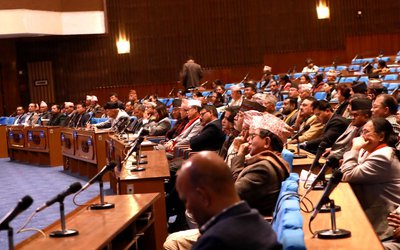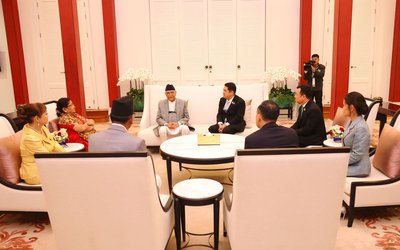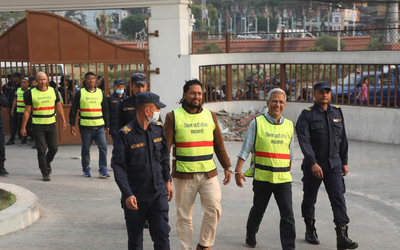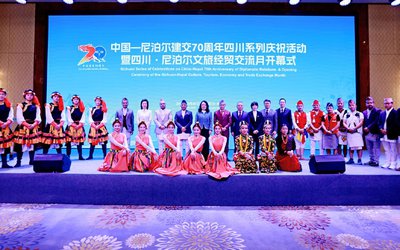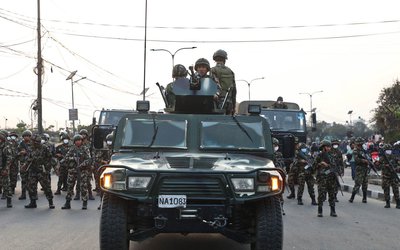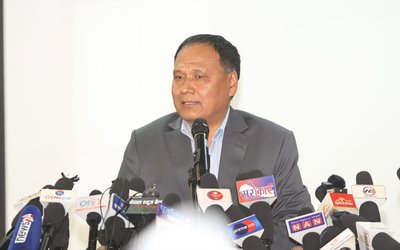
UN WOMEN have already started the distribution of dignity kits to earthquake affected women. In Collaboration with its partners, UN Women has already distributed a hundred dignity kits to the Women and Children Officers in both Sindupalchowk and Kavre districts respectively.
According to a press release issued by Seetashma Thapa Communications and Partnership Officer, UN Women Nepal Country Office, UN Women, a further 100 kits each distributed to three women’s organizations – SAATHI, Women for Human Rights (WHR), Women’s Rehabilitation Center (WOREC) targeting women with disability, elderly women and female headed households in five affected districts of Kathmandu, Sindhupalchowk, Kavre, Nuwakot and Gorkha.
“An additional 50 dignity kits have been distributed to Positive Women’s Network. More than 30 volunteers from UN Women partner organizations that focus on excluded women – such as Pourakhi (an organization for migrant women workers) and SABAH (an organization for home-based workers) – are putting together these dignity kits. These women volunteers have expressed their determination to be on the front lines being actively involved in the relief process,” said press release.
Dignity kits contain 17 items which include clothing as well as basic hygiene items, such as soap, nail clippers, undergarments, toothpaste and a toothbrush, sanitary pads, a torch light, etc. Dignity Kits contains basic necessities that will enable displaced women and girls to maintain feminine hygiene, dignity and respect in their daily lives.
“The dignity kits will be provided to the most vulnerable women whose lives have been devastated because of the earthquake. These are women that are disabled, elderly and those that come from women headed households.” said Singh, Women and Child Development Officer of Sindhupalchowk.
According to UN Women estimates , the 13 most affected districts include approximately 318,000 female-headed households, 38,000 women with disabilities, 157,000 women over the age of 65 years, 738,000 girls aged 14 or under, and 765,000 women and girls who are illiterate. Approximately 40,000 women are at immediate risk of gender-based violence.
The earthquake severely impacted 13 out of the 75 districts in the country ,most deeply affecting the poor living in rural areas, the elderly, and disabled women as well as those from female-headed households.
During times of natural disasters and conflicts, it is mainly women and children that bear the brunt of the crisis. According to UN reports, they are more vulnerable to rape, sexual exploitation and risky behavior that greatly increases the likelihood of unwanted pregnancies, sexually transmitted diseases and complications for reproductive health.
“ Furthermore, at times of disasters disadvantaged women such as disabled, elderly and those from female headed households are at the often last in line to receive assistance. This is the result of several obstacles such as lack of access to information, long walking hours to receive aid, and having to perform household chores. In addition, social norms may make it challenging for female-headed households to access relief items. This is of concern, particularly in some of the Village Development Committees (VDCs) where the majority of economically active men are migrant workers. UN Women estimates that there are approximately 318,000 female-headed households in the affected districts,” said UN Women Press release
- IME GROUP: Expands Into Paper Industry
- Mar 24, 2025
- CPN UML: Instigated By India
- Mar 23, 2025
- ADB’S CHIEF ECONOMIST: Nepal Reduces Poverty
- Mar 11, 2025
- FM DR. DEUBA: A Successful Visit
- Mar 11, 2025
- MD GHISING: Target Of Personal Grudge
- Mar 09, 2025
